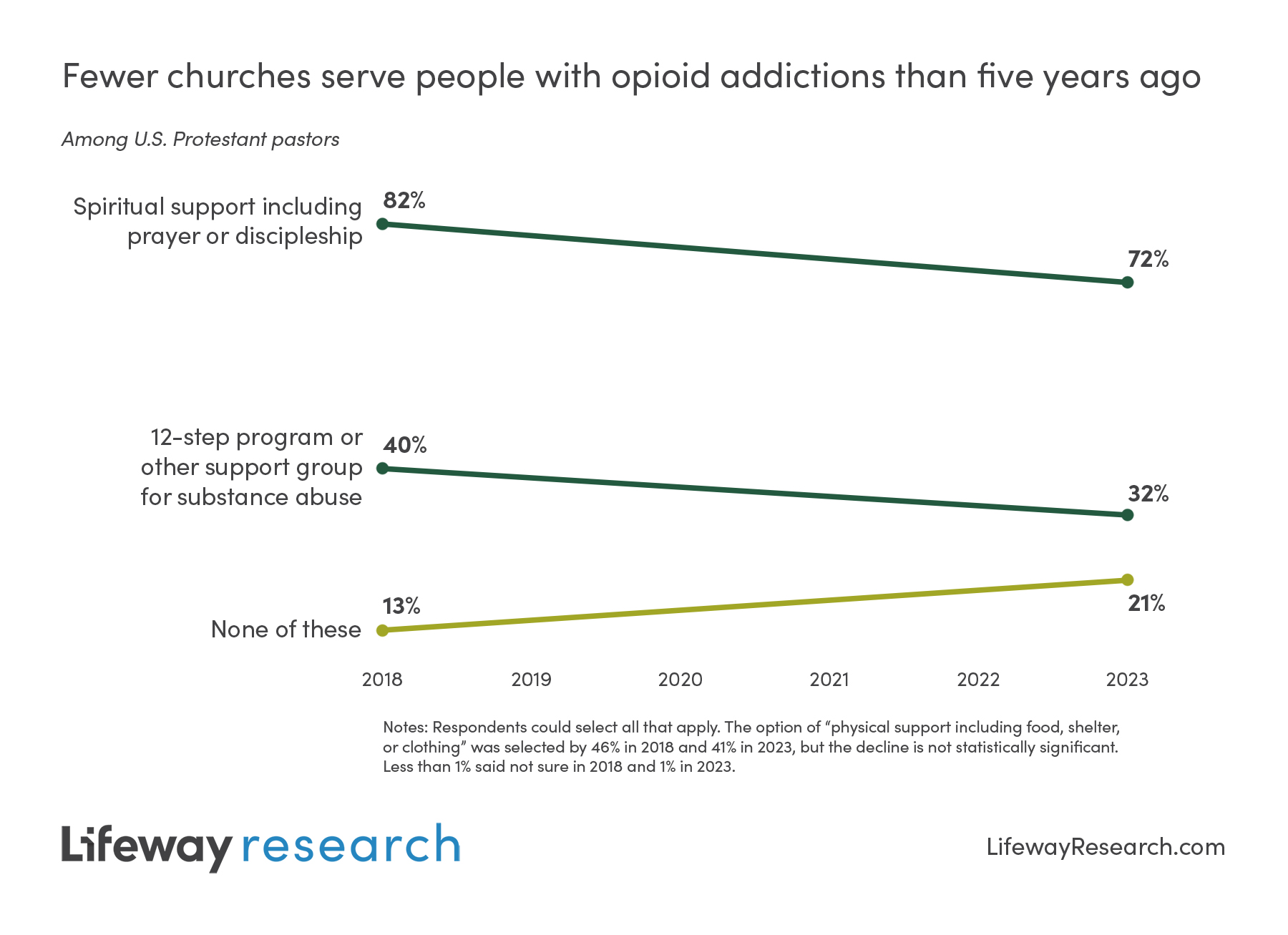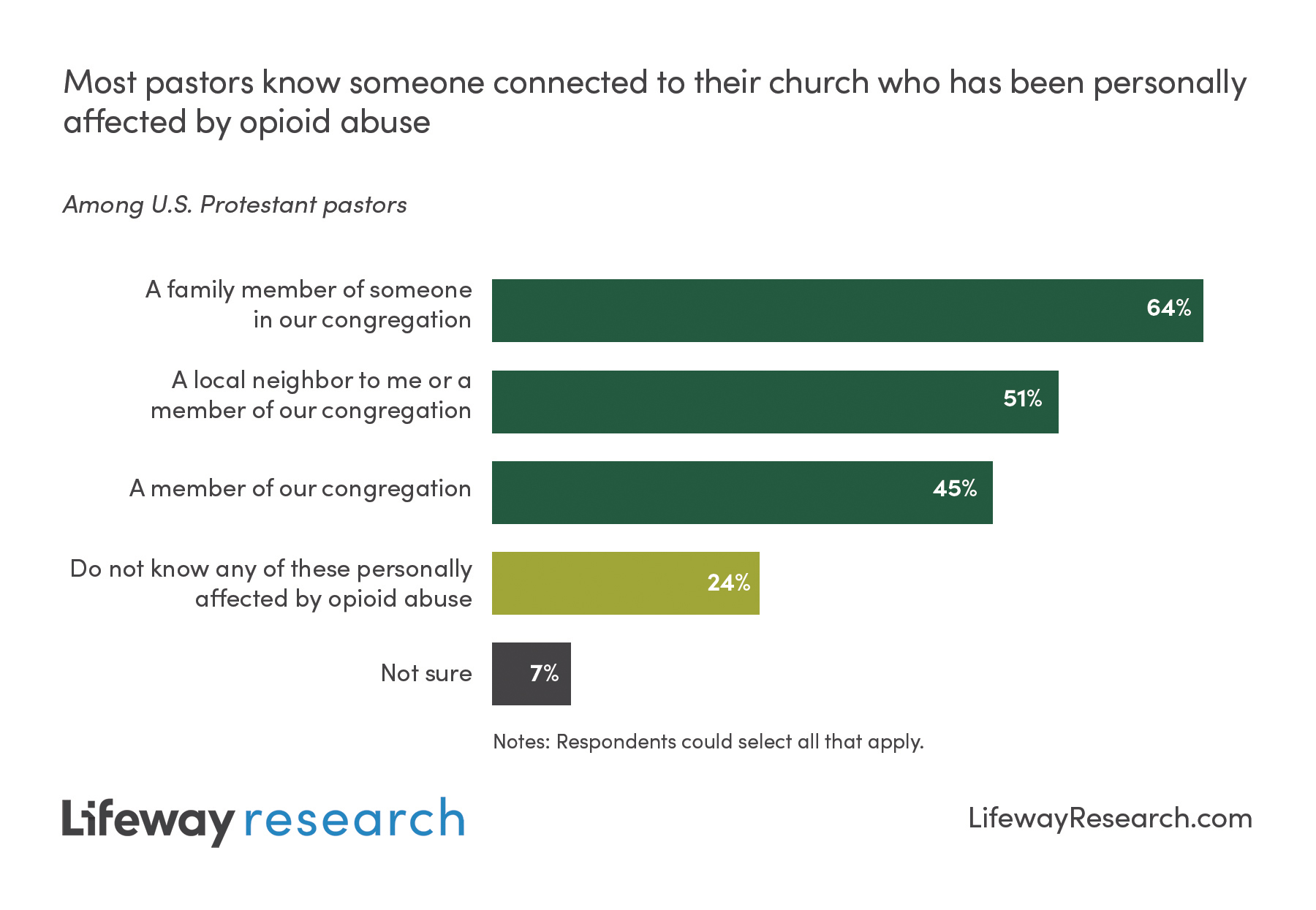More Americans are dying of opioid abuse, but fewer churches are serving those with opioid addictions.
A Lifeway Research study found U.S. Protestant pastors are just as likely to say someone connected to their congregation has been personally affected by opioid abuse today as compared to five years ago. They are less likely, however, to report their church is providing spiritual support for those addicted or any type of support group for those dealing with substance abuse.
“Opioid abuse is widespread in America, and more than two-thirds of Protestant churches know someone they can personally help with the fallout of opioid misuse,” said Scott McConnell, executive director of Lifeway Research. “These may even be the same people who were on a church’s prayer list for another ailment that introduced them to a helpful opioid that started an addiction.”

Congregational connections
In 2022, opioid abuse resulted in 82,000 Americans’ deaths, the most ever recorded, according to the Centers for Disease Control and Prevention (CDC). In 2021, an estimated 2.5 million adults in the U.S. dealt with opioid use disorder, while more than 10 million people misused prescription opioids in 2019, according to the CDC. Many churches felt the impact.
Lifeway Research found around 2 in 3 pastors (64%) say a family member of someone in their congregation has been affected by opioid abuse. Around half (51%) say a local neighbor they know or a member of their congregation is dealing with opioids, while 45% say a member of their congregation has been personally affected by opioid abuse. Around a quarter (24%) say they don’t know any of those who were personally affected by opioid abuse, while 7% aren’t sure.
Most of the numbers are statistically unchanged from 2018, except fewer pastors say the issue is in their congregation today. In 2018, 52% of pastors said a member of their church had been personally affected by opioid abuse, compared to 45% today.
“Awareness of the dangers of opioid addiction continues to grow, but people naturally seek to hide all forms of substance abuse. If congregations are not expressing compassion for those who face these challenges, they likely won’t become aware of needs until the abuse is chronic,” said McConnell.
White pastors are among the most likely to say they see individuals dealing with opioids, including a family member of someone in their church (68%), a local neighbor (52%) and a member of their congregation (48%). Older pastors are among the least likely to see connections within their churches.
Restorationist movement pastors (55%) and those at non-denominational churches (55%) are more likely than Methodist (39%), Lutheran (33%) or Presbyterian/Reformed (31%) to say they have seen a member of their congregation personally affected by opioid abuse.
Lutheran pastors (35%) are more likely than their Baptist (24%), Methodist (23%), Pentecostal (18%) and non-denominational (13%) counterparts to not know any of the three types of people possibly affected by opioid abuse.
Church support
Most pastors say their church is currently serving people with opioid addictions, but that support is primarily spiritual. Almost 3 in 4 (72%) offer spiritual support including prayer or discipleship. Fewer say they’re providing physical support including food, shelter or clothing (41%) or a 12-step program or other support groups for substance abuse (32%). Around 1 in 5 (21%) say they aren’t doing any of these, while 1% aren’t sure.
Statistically fewer churches today say they are offering spiritual support, down 10 percentage points from 82% in 2018, or substance abuse support groups, down 8 points from 40%.
“Spiritual, physical and recovery help can all be ongoing ministries of a church or offered as needed,” said McConnell. “When these are ongoing support ministries, there are naturally more opportunities to encounter and help those impacted by opioid abuse.”
While white pastors are most likely to know someone connected to the congregation dealing with opioid abuse, African American pastors are more likely to say their church is providing physical support for people with opioid addiction (54% v. 41%).
Restorationist movement (52%), non-denominational (52%) and Methodist (47%) pastors are among the most likely to point to their congregation providing physical and tangible help. Pentecostal (79%) and non-denominational (81%) pastors are among the most likely to say their church offers spiritual support, while Methodist pastors (37%) are one of the most likely to say their congregation has substance abuse support groups or programs.
Pastors at the smallest churches, those with fewer than 50 in attendance, are the most likely to say they’re not serving people with opioid addiction in any of the three ways asked about in the study (28%).

For more information, view the complete report and visit LifewayResearch.com.
